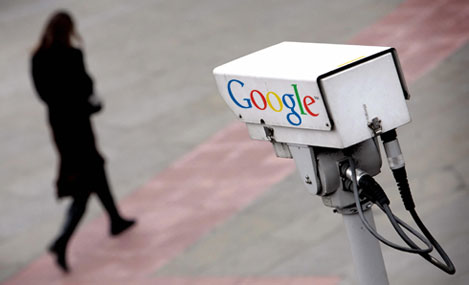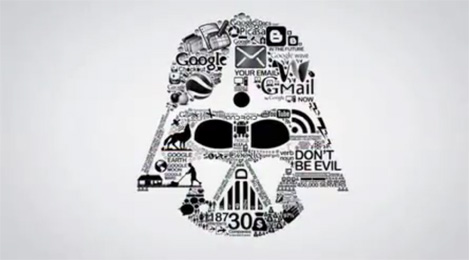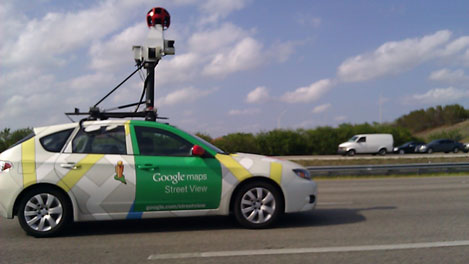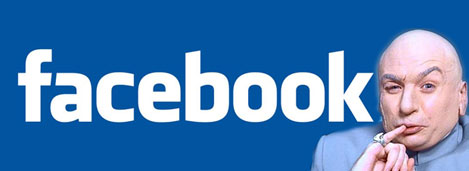Whatever happened to privacy rights?

Nowadays, it seems that the right for privacy in the internet has become a very controversial issue. Now with the rapidly spreading boom of social networks and the rise of internet services, which have evolved enough to be able to show us every single detail of every single street on earth, you have to wonder: where do my rights for privacy begin and where (if such rights indeed exist) do they end?
“Don’t be evil” is google’s very informal corporate slogan. However, it has become a titanic task for huge companies such as the latter to keep their “evil-free” image.

The first thing that comes to my mind whenever I think about privacy is that people are pretty naive when dealing with the internet. Immagine that you’re on the street and a stranger you’ve never met before comes near you and starts asking personal questions: your name, address, marital status, etc. Normally, you would refuse giving such information and proceed to ignore the “intruder”. In some other cases you could even feel such individual could become a threat and try avoiding contact. Maybe even in some cases you could start getting a little aggressive and insult the “stalker”. Nevertheless, if Facebook, Google or Twitter asks you for the very same information, you promptly give every single detail of your life.
These huge social network companies keep struggling against constant lawsuits on grounds of privacy invasion. For instance, thanks to complains by the German government, Google Street View has to apply a blur effect on certain locations to avoid showing car plates, faces or homes.
It doesn’t matter how many setbacks they have had: these services remain online. Nowadays, to see a Google Maps Street View vehicle on the streets has become fairly common. On the other hand, Facebook is becoming bigger and bigger every single minute.

Facebook has updated its privacy policies and their privacy settings management system many times. Unfortunately, these measures have shown to be highly ineffective… Which sucks big time. Julian Assange himself has publicly stated that Facebook is one of the most frightening spying tools ever created.

The question then would be, should we really trust these corporations with our data? Aren’t these companies similar to (or even worse than) the stranger who was stalking us on the street asking about personal stuff out of the blue? Facebook, Google and Twitter are managed by people; not robots… So, isn’t it kind of terrifying to have such perfect strangers know so much about us?
 |
Former (stepped down on april 4th, 2011) Google CEO, Eric Schmidt, stated once on his own defense that if you had a thing you didn’t want anyone to know about you probably shouldn’t have been doing it in the first place. But how much of this is true? | |
We already know that organized crime can use these social tools to get access to valuable information on their victims; which they study and choose carefully as if using an online catalog: A feisty menu for crooks to rob, kidnap, blackmail, etc.
 It’s also practically a known fact that american and many other countries’ intelligence agencies keep check on communications and data from major social networks.
It’s also practically a known fact that american and many other countries’ intelligence agencies keep check on communications and data from major social networks.
So where is this road leading us to? Google, for instance, is in our computers, social relationships, mobiles, streets, shopping, and every single aspect of our life: they even promote DNA research! Google is basically everywhere; omnipresent in our lives. Am I being a little too paranoid here or is this disturbing thought justified?
The fact is that the struggle for privacy rights seems to be losing ground and the balance is slowly inclining towards a literally public life for everyone. There are already companies which ask you for your Facebook profile along with your resume before any chance of hiring you…


It’s pretty likely that in the near future our ID’s will become Facebook digital credentials in our smartphones saved in our Android Wallets which we will also obviously use to pay for the goods we buy as our bank accounts will be linked to our virtual wallets. Oh! And of course we will still be able to use our smartphones to make regular phonecalls as they still are phones, right?

Recently, I made a review on the Nintendo 3DS, and amongst the many apps it has available there is one called Street Pass. It is a virtual community crowding with Mii avatars from people who we cross paths with everyday (as long as we have our 3DS with Street Pass active on us). This called my attention because I think this is one of the many things we’ll be seeing in our smartphones very soon. Maybe in a couple of years we won’t need to exchange business cards or ask for emails or phone numbers.
 Surely we’ll come back home and in our phones we’ll have a checklist of all the people we met (within a certain distance) during the day. We could have access to the personal data (phone number, email, address, occupation, facebook, twitter and much more) of that hot woman we liked so much at the bus stop and get to know her instantaneously. We could also get to know if as we were walking to the office we raan into a plumber who could solve that messy leak in the sink of the kitchen.
Surely we’ll come back home and in our phones we’ll have a checklist of all the people we met (within a certain distance) during the day. We could have access to the personal data (phone number, email, address, occupation, facebook, twitter and much more) of that hot woman we liked so much at the bus stop and get to know her instantaneously. We could also get to know if as we were walking to the office we raan into a plumber who could solve that messy leak in the sink of the kitchen.
Anyway, from a kind of optimistic yet naive point of view this cutting edge technology could have many positive uses. However, isn’t that same technology available for people with darker intentions? In case this becomes a fact, it would be very wise to think very carefully what information to share. Also, it would be in the best interest of everyone to ask for some sort of confirmation when sharing data with a recently met acquaintance.
The important thing here is to think a little about what’s going on around us and stop being naive. Accepting that there’s a significant value on the management of our private information should be the first step. If you don’t believe me, how come these companies are so filthy rich? It’s because their profits come from advertising. That’s why they need to know who we are, what we do, who we do it with and what we like so they can keep making profits out of us. Profits which no Facebook, Google or Twitter user will ever directly benefit from.
So, those were my thoughts on privacy. I hope you find them useful when dealing with privacy in the internet. Make your own conclusions. And please, don’t leave without commenting on the subject: what are your impressions about this? Do the people working for these humongous corporations really worry about our privacy?
English translation by Wayka Mariño (Wayvias CEO)
